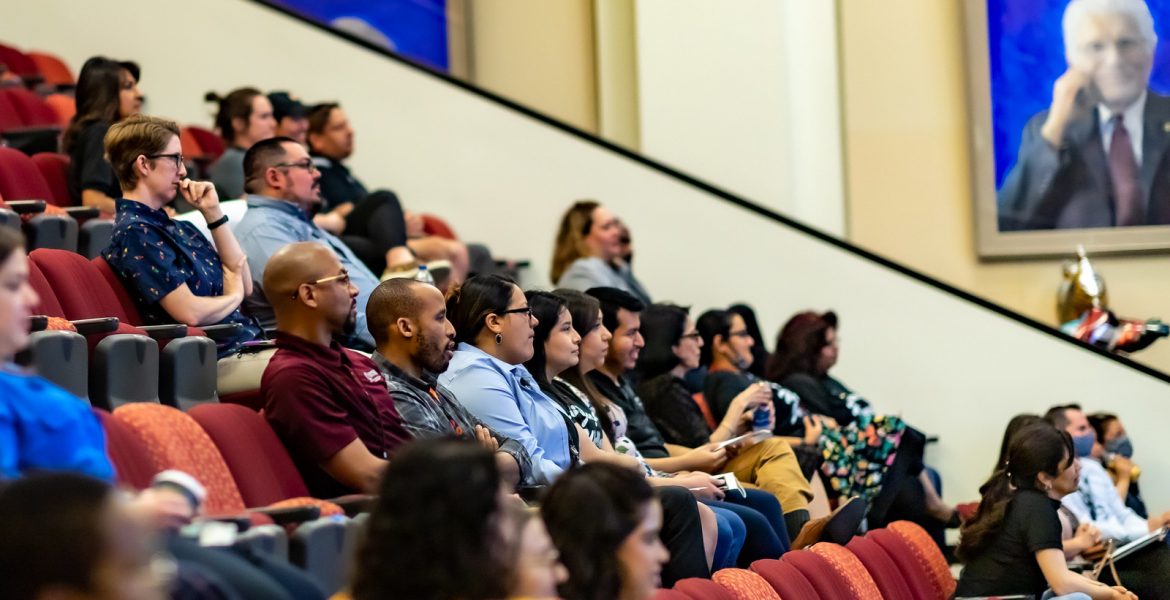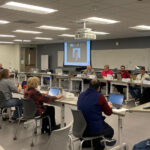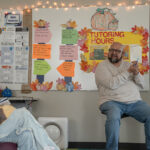The recently appointed head of Marketing and Communications, faculty and staff representatives weighed in on improving morale at Texas A&M University-San Antonio following claims of poor leadership and toxic work environment of past Marcom leadership.
Jarrick Brown, Staff Council president, said the university is working for a better working environment “not only for the Marketing department but for the entire campus.”
“I will say, as staff council president, from that article and from information that the university leadership was aware of, that’s part of our strategic plan … we are working on creating a good workplace environment for all of campus,” Brown said.
The strategic plan entails holding town hall meetings, staff-employee engagement surveys, roundtables with high-up directors and taking feedback from faculty and staff about improving the on-campus experience, Brown said.
Scott Gage, president of the American Association of University Professors at A&M-San Antonio, said he hopes staff reaches out to his organization in the future to advocate for them.
“Although AAUP most immediately represents faculty, we stand in solidarity with all workers at all levels,” Gage said. “To know that some of our colleagues were treated in this way, it is deeply concerning.”
Gage said Jeanette De Diemar, former vice president for advancement and external relations, caused a lot of damage in Marcom. He said it is concerning complaints were being filed and “the mechanisms of our university were not such that employees were heard.”
Gage said university leaders should bring stability to the university and boost morale.
“The article makes clear none of that was happening,” Gage said. “When you have portions of the campus where there is discrimination or a hostile work environment, that ripples out.”
Gage said these issues affect students, staff and the work of faculty. In addition, it hurts the university’s ability to achieve the institution’s goal.
Jesse Pisors assumed the role of vice president for advancement and external relations on March 28. He said Marcom is designed to “strengthen and expand” the university’s brand, especially at A&M-San Antonio, which is the department’s main focus.
As Pisors has been leading the department for a few weeks, he said he has “not fully formulated” a mission statement for university relations and advancement.
“I do know where I think we need to go and where I want to help lead this group,” Pisors said.
Gage said John Sharp, Texas A&M University System Chancellor, visited the A&M-San Antonio campus recently. A survey conducted revealed a very low percentage of Bexar county is aware of A&M-San Antonio’s existence, Gage said.
Pisors said the university is working on developing brand awareness within the community.
“When we, as the university, sponsor or participate in some event in the community, that’s strengthening our brand,” Pisors said.
Throughout De Diemar’s tenure, Marcom witnessed high turnover. According to Gage, high turnover is concerning because it affects the university’s ability to efficiently fulfill its mission and market itself.
Gage said the past work environment in Marcom hurt the university’s reputation among future potential employees; it created an impression of Marcom where “professionals may not want to work.”
“I’m concerned about our ability as an institution to move forward and to really achieve our potential because we have the potential to be an amazing university,” Gage said. “We need people who are talented, who are capable and who are committed, and the rate of turnover that we see happening — it inhibits our ability to recruit those kinds of people.”
However, Brown said turnover is not an exclusive problem to A&M-San Antonio; it’s across the world because of the pandemic.
“It’s the great resignation, and it’s not just in higher education,” Brown said. “It’s going from all companies and businesses.”
Brown added the pandemic has also changed employee mindsets, favoring working from home.
University employees have also felt burned out in response to the pandemic. Gage said the university needs to better acknowledge burnout.
“The university has done nothing to acknowledge that in any kind of meaningful or substantive way,” Gage said. “I know that if they were to do so, I don’t know what that would look like, but I do know it would look like more than them just (giving) a passing comment about knowing how hard it’s been. I think that would give a boost of morale to a lot (of) people.”
Brown said the university is “working diligently” to change the culture of the campus for staff and faculty, though change will not occur overnight.
“I will say that Dr. Matson (and) the president cabinet is doing everything they can to make this a campus where faculty and staff will want to stay and work here for a long period of time,” Brown said.
Pisors said he thinks there is a “positive feeling” in Marcom. Although, workplace culture “isn’t established overnight,” he said.
“I want to establish and I want to lead the creation of a workplace culture in Marcom that is positive, that is encouraging, that is a place where people want to work and they want to stay,” Pisors said. “So creating the right kind of a culture within Marcom for the staff, for the employees is very very important to me, and I would say that anywhere I went.”
Pisors said administrators can encourage employees to stay longer by helping employees with professional development and encourage a sense of success.
“I think as employees begin to see that attitude and mindset from their leaders, I think they’ll really want to stick around,” Pisors said.







